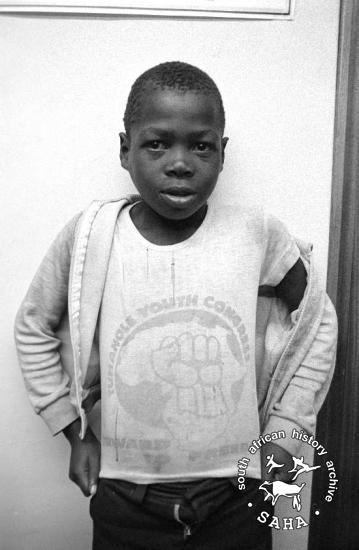
I had recently looked up the ‘Winnie’ documentary out of interest. While the documentary left me thinking, it did not resonate with me in the way that it has on Twitter over the past few days. If you haven’t seen it, The Daily Maverick has a good summary of its revelations here and you can see the trailer here.
The film presents a fascinating look at the woman’s life but the discussions around it have really just collapsed down to one issue: what was her involvement in the death of Stompie Seipei, an anti-Apartheid activist and organiser from the age of 10 and the youngest ever police detainee at the age of 12?
I was more surprised to learn that she had had an affair with the EFF’s Advocate Dali Mpofu than the revelations from former members of the apartheid regime’s Stratcom team. I took the revelations as just more evidence of the sickness of the times that only served to further muddy the reality of what happened.
It’s a sad fact of life that many controversial events only tend to be resolved (if they ever are) after the people in question die. Regardless given of everything that’s come to the fore since the passing of Madikizela-Mandela, if I was asked to make a judgement on the events, I would say that she likely was not directly responsible for the death of Stompie Seipei but it’s things remain incredibly murky and we’ll probably never know for certain.
The case against
Why do people believe that she was involved in Seipei’s death? It mainly comes down to the fact that the events occurred in her house on her property and were perpetrated by members of her football-team-come-bodyguards, Mandela United Football Club (MUFC), who had a reputation for thuggery (neighbours had even earlier burnt down her house in retaliation for their actions in the local population). [UPDATE] See the ANC’s own statement from 1989 with regards to MUFC.
In addition, the man who confessed to the actual killing, MUFC’s ‘chief coach’, Jerry Richardson, says she was directly involved, as does a former ANC comrade, Katiza Cebekhulu, who was abducted by the ANC and held for three years in a Zambian prison (as verified by former Zambian president, Kenneth Kaunda).
[UPDATE] Also, some point to the death of Stompie as one in a pattern of suspicious deaths surrounding Madikizela-Mandela that also included the deaths of Lolo Sono (21) and Siboniso Shabalala (19).
It’s worth reading Wikipedia’s succinct summaries here and here. In addition, this news report from the TRC sums up some of the often contradictory evidence:
The case for
So why is her story being re-written after her death? Well, let’s discuss the points that have been highlighted over the past week…
Vic McPherson, the former head of the notorious Security Branch’s covert Strategic Communications unit, or ‘Stratcom’, reveals that they ran an intensive propaganda campaign to discredit her in the 1980s. McPherson says in the documentary that he had about 40 journalists in his employ at the time which helped push their angles. This isn’t really a revelation either; it was already claimed at least as far back as 1995 when esteemed journo, Stefaans (now with the Gupta-busting amaBhungane investigative unit), reported similar claims by one of McPherson’s senior operatives, Paul Erasmus (as an aside, Erasmus pops up in numerous covert ops areas, such as his scuppering of protest singer, Roger Lucey’s, career – see the documentary, “Stopping the Music” – which is probably why he had to live with his family in witness protection post-1994).
Listen to Erasmus cover similar ground just this week to what he claimed to Stefaans all the way back in the 1995:
[iframe src=”https://omny.fm/shows/the-breakfast-show-702/the-much-anticipated-award-winning-pascale-lamche/embed” width=”100%” height=”180px” frameborder=”0″]
[UPDATE] It seems like Erasmus’ comments need to be taken within the context of his level of exposure to the Madikizela-Mandela case. According to his testimony at the Truth & Reconciliation Commission (TRC), he was not assigned to her case until 1990 (a couple years after Stompie’s death) and he was not particularly close to the assignment:
MR PIGOU: So would you be saying then that much of the information or some of the information, I don’t want to put a figure on it, or a percentage or whatever, proportion of the information that came out about the activities of the Football Club was indeed factual then, it was actually happening it was happening out of that back yard in Soweto?
MR ERASMUS: A lot of the information yes, was correct. I never specialised, I must just point out, Mrs Mandela even at the height of these activities was one of many people that I dealt with, I didn’t have the time or the opportunity or in fact the capacity to make a full study of a given situation. My work load was just too heavy to do it.
He also comments on whether or not he knew of Stratcom ‘falsifying’ evidence against Madikizela-Mandela:
MR PIGOU: …were you aware or to your knowledge was Operation Romulus used to intervene in criminal investigations in order to falsify information or evidence to involve Mrs Mandela in criminal activities such as the Stompie Seipei killing and the kidnapping? […] I mean we are talking now about falsifying evidence which could be used for criminal prosecution.
MR ERASMUS: No I am not aware of that.
Then, the man accused of killing Stompie, Jerry Richardson, turns out to have been an apartheid informant (UPDATE: although it’s not clear whether he was at the time of the murder or only subsequently once in prison) and the documentary claims that he killed Stompie for finding out about his dual role. This scenario is lent credence by Paul Erasmus’ claim that most of the Mandela United Football Club were paid informants of the apartheid regime. [UPDATE] However, the South African National Editors Forum (SANEF) has cautioned against believing such unsubstantiated claims however and the journalists that were named by Madikizela-Mandela specifically have strenuously denied the claims that they were apartheid regime collaborators. In addition, see The Huffington Post’s apology for publishing these unproven claims without affording the accused journalists the right of reply.
Watch the director of the “Winnie” documentary, Pascale Lamache, sit down with Madikizela-Mandela to share some of their research into the events that transpired:
What to believe?
The Stratcom version of the story is deeply embedded in our national psyche today because of the cunning and dogged determination with which they pursued the disinformation campaign at the time. That was their job after all and they appear to have been pretty good at it. This quote sums up Stratcom’s strategy and explains why the truth will likely remain muddied forever:
“…Stratcom dogma was that propaganda of that type should be based on 70 percent fact and 30 percent fiction. “You create a perception. Even when some of it can be disproved, since some of it is true people think all of it is true.””
~ Paul Erasmus quoted by Stefaans for the Mail & Guardian in 1995
So which 30% is fiction in the case of Stompie’s death? Did they manufacture the extent of her involvement or did she do the hard work for them and they simply amplified the reality of her involvement? [UPDATE] According to Paul Erasmus’ TRC testimony above, they did not fabricate any criminal evidence against her in the Stompie case which would seem to imply that they only amplified and spun the facts.
If we can’t be confident in the media coverage though can we trust the people on the ground? Well, the UDF and many in her community believed she was guilty at the time. It’s not clear though whether or not they had any other knowledge other than the same media coverage that everyone else relied on, but they must surely have had direct connections with some in the ANC who were closer to the events?
Similarly, Archbishop Desmond Tutu (who nonetheless lauded her contributions to the struggle just this week) seemed to believe that she was guilty of something during her TRC hearing as footage in the documentary shows.
Poignantly though, Stompie’s mom believes that Madikizela-Mandela was innocent. [UPDATE] Watch her describe meeting Madikizela-Mandela in her own words here.
Even if Madikizela-Mandela had no hand in Seipei’s (or any others’ death), this doesn’t completely absolve her from questionable actions and behaviour. There’s still the matter of the infamous “necklace speech” where she exhorted activists to murder police collaborators in the most brutal manner. Her comments give some indication of what she advocated and was capable of:
“…with our boxes of matches and our necklaces we will liberate this country.”
~ Winnie Madikizela-Mandela
But, there’s a big difference between playing with dangerous words and actions. Just ask Julius Malema who wants to “cut the throat of whiteness” (and then says things like this).
Regardless, we are left asking ourselves, should we believe Katiza Cebekhulu who endured a nightmarish abduction and detention in a Zambian prison for three years and Jerry Richardson who turned out to be an apartheid informant and who might have had his own reasons for killing Stompie, particularly when their stories were reported through the twisted lens of a very effective Stratcom campaign?
Or, should we believe the claims made by the same Stratcom masters of disinformation who were tasked with destroying her in the first place but who subsequently claim they had no real evidence against her?
We’ll probably never really know for sure and it’s a tough call but I’m giving her the benefit of the doubt but hopefully the furor that has arisen around her death will shake free the truth given enough time.
The saddest part is that a young boy lost his life fighting a battle that no one should have been fighting. My heart breaks every time I look a Stompie’s tentative, child-like stance in the below police photo.





